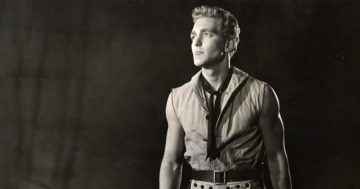Sudip Bose at The American Scholar:
 During the three years that Billy Budd took shape, Britten and Forster occasionally disagreed about just how brazen the piece should be. In one instance, Forster complained that one of Claggart’s arias was just not hot-blooded enough. “I want passion—love constricted, perverted, poisoned, but nevertheless flowing down its agonising channel; a sexual discharge gone evil,” Forster wrote. “Not soggy depression or growling remorse.” Britten—who had largely been circumspect about his own homosexuality, publicly avoiding the subject of his long relationship with the tenor Peter Pears—strongly disagreed, and as a consequence, a rift opened up between librettist and composer, the one a daring idealist, the other a more cautious realist.
During the three years that Billy Budd took shape, Britten and Forster occasionally disagreed about just how brazen the piece should be. In one instance, Forster complained that one of Claggart’s arias was just not hot-blooded enough. “I want passion—love constricted, perverted, poisoned, but nevertheless flowing down its agonising channel; a sexual discharge gone evil,” Forster wrote. “Not soggy depression or growling remorse.” Britten—who had largely been circumspect about his own homosexuality, publicly avoiding the subject of his long relationship with the tenor Peter Pears—strongly disagreed, and as a consequence, a rift opened up between librettist and composer, the one a daring idealist, the other a more cautious realist.
For the most part, Billy Budd faithfully adheres to Melville’s story, though it differs from the novella in a few prominent ways. One of these has to do with the character of Captain Vere, a prudent, intelligent figure in the novella who ultimately condemns Billy despite his paternal fondness for him.
more here.
